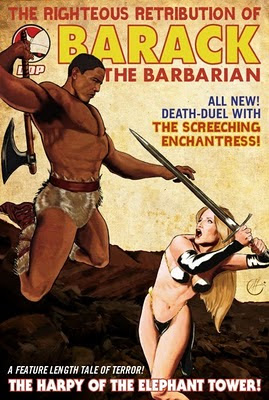As everyone familiar with Peanuts is aware, every year, Linus waits in the pumpkin patch for the Great Pumpkin, who flies overhead and delivers toys for all of the children. But this year, cartoonist Bob Gorrell has a slightly more political take on young Mister Van Pelt's annual vigil...
And so I still wait here for the Great Pumpkin, who will bring me a candidate who puts what's good for the country ahead of his own re-election...
One of the things about political cartooning that I've never been able to work out for myself is which is better - clarity or ambiguity? I find this particular cartoon to be somewhat ambiguous, because I don't know how sympathetic the character of Linus, in his representation of the general public, is supposed to be. In Peanuts, Linus is well-intentioned, but deluded. He doesn't understand that there is no such thing as the Great Pumpkin.
But here, the fact that the Great Pumpkin is a figment of the imagination isn't the problem - Linus' wish is, on a certain level, directly antithetical to Democracy. (I also find it to be a bit elitist, which leads me to believe that Gorrell, an avowed conservative, might be referring to the more liberal side of the electorate, rather than the citizenry as a whole.) The sort of "political courage" that Gorrell's Linus is wishing for is the Holy Grail of minority politics - a politician who is more invested "in doing the right thing," than in representing the wishes of the majority of their constituents. And, of course, it's only considered political courage by such a grateful minority - to the majority that's going to squash the politician's hopes of re-election, it's "
ignoring the will of the people," or some other such sin against populism. (The Obama administration's health care initiative, which Mr. Gorrell is
clearly opposed to, seems to be a pretty obvious example to call upon here.)
But even if we take Linus at his word - that he wants a politician to whom doing right by the nation is more important that winning re-election - if a politician has to choose between acting in the best interests of the public and acting in accordance with the public's wishes, there's a problem there - and it's not with the politician. Were any manager or supervisor to fire an employee specifically for doing what they had been hired to do, rather than making the manager or supervisor happy, the general consensus would be that the corporate culture was unbelievably broken, and that the company was surely headed for trouble. But we don't seem to perceive that same problem in ourselves.
It's worth keeping in mind two facts. One: The majority of the public always believes that whatever it wants is, more or less by definition, what is good for the country. Two: Legislation that is vigorously enough opposed by the public will be repealed, ignored or otherwise invalidated. Taking these two things together leads to (in my not particularly humble opinion) the following conclusion: Any political movement based on doing what is good for the country in the face of a majority opinion to the contrary is doomed to fail.
So I suspect that Gorrell is using Linus to stand in for the sort of electoral wishful thinking that most people understand to be fatuous, at best, and deliberately disingenuous (if not dishonest) at worst. In which case, Linus (whether you regard him as a stand-in for liberalism or the entire American electorate) is going to be in that pumpkin patch a
very long time.














